Have you ever wondered why the name ‘American Eskimo Dog’ for a breed that’s neither from Alaska nor related to Eskimos? Well, let me tell you a story. As a kid, I was fascinated by these white dogs – or ‘Eskies’’ as we fondly called them. Their snowy coat, playful barking, and curled tail were simply irresistible!
Despite their misleading name, these spitz dogs are popular in America and make excellent family dogs. They’re classified into three sizes – small, medium, and large – each with its charm. Whether you need a farm dog or just a pet to cuddle with, there’s an Eskie for everyone.
So next time you see one of these puppies wagging its tail at you from the kennel, remember – they might not be true Eskimos, but they have their unique charm!
Table of Contents
- 1 Historical Background of American Eskimo Dogs
- 2 Characteristics and Traits of American Eskimo Dogs
- 3 Exercise Needs of American Eskimo Dogs
- 4 Grooming and Health Care for American Eskimo Dogs
- 5 Dietary Requirements for American Eskimo Dogs
- 6 Wrapping Up Your Eskie Knowledge
- 7 Related posts:
- 8 Unveiling the American Eskimo Dog Temperament: A Detailed Guide
- 9 American Eskimo Dog Shedding: What to Expect!
- 10 Complete Guide to Raising an American Eskimo Puppy
- 11 American Eskimo Dog Colors: Complete Guide
Historical Background of American Eskimo Dogs
German Roots and Migration
The history of the American Eskimo Dog traces back to its German roots. Part of the Spitz family, these dogs were initially bred in Germany. They migrated to America with German immigrants.
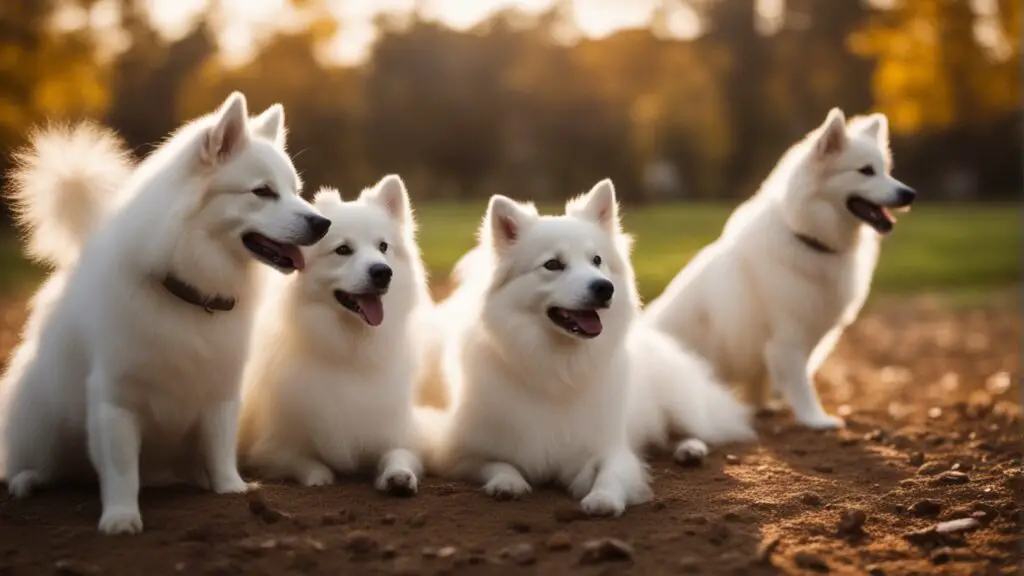
Gold Rush Era Role
During the Gold Rush era, these dogs played a significant role. They served as:
- Companions
- Watchdogs
- Sled dogs
Their versatility made them indispensable during this period.
Circus Performances
In the 19th century, their origin story took an interesting turn. These dogs became popular in circus performances due to their:
- Intelligence
- Trainability
- Eye-catching white coat
This exposure boosted their popularity among American households.
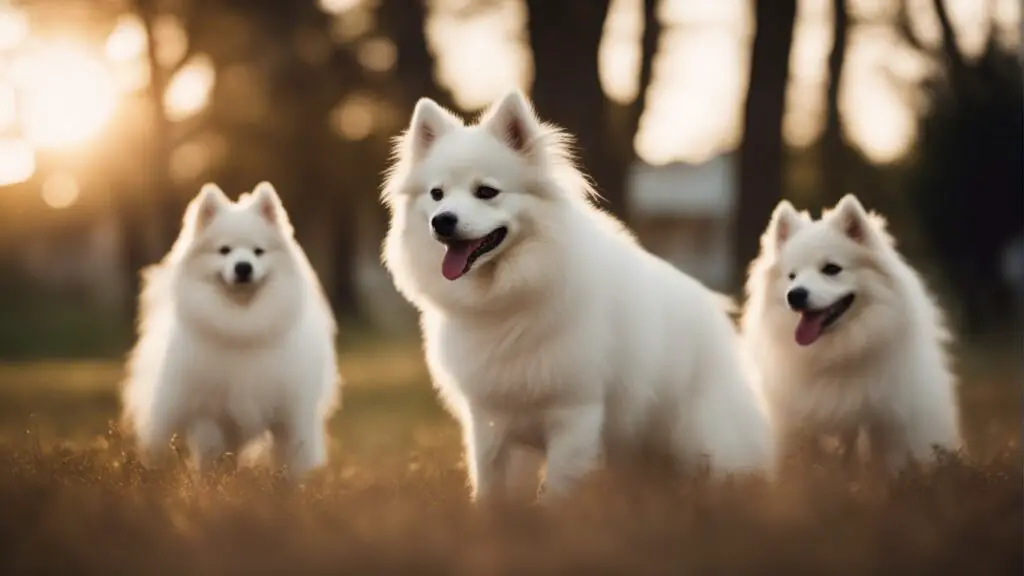
So, from their journey across continents to their time under the big top, American Eskimo Dogs have a rich and varied history that contributes to their charm today.
Characteristics and Traits of American Eskimo Dogs
Distinctive Appearance
American Eskimo dogs, part of the spitz breed, are instantly recognizable. They sport a fluffy white coat as pure as freshly fallen snow. Their bushy tail adds to their charm, often curling over their back in a playful arc.
- Coat: Pure white or cream-colored
- Tail: Bushy and usually curled up
But it’s not all about looks with these pups. Their personality is equally captivating!
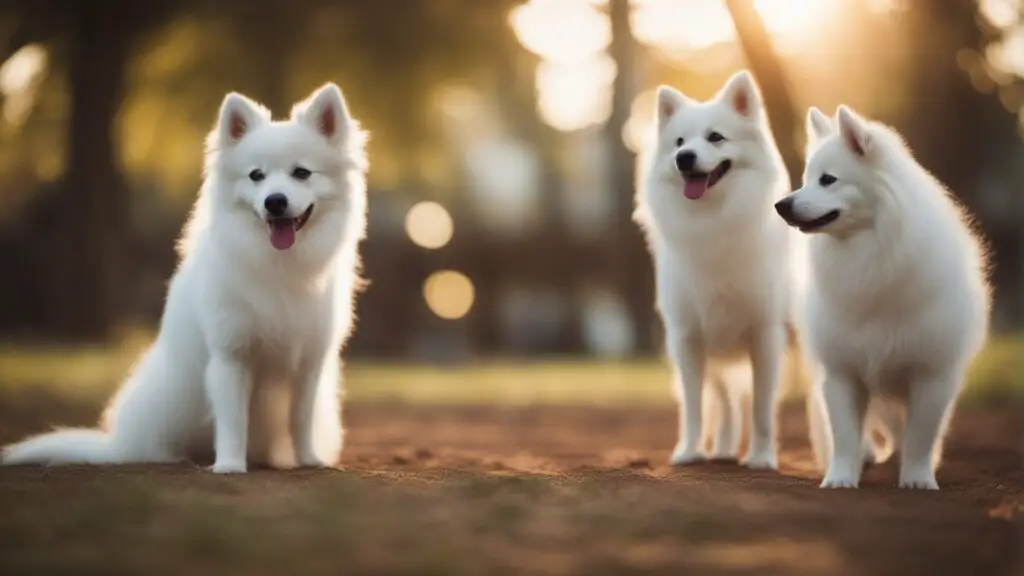
Personality and Behavior
As they’re affectionately known, Eskies have a friendly nature that’s hard to resist. They’re alert and intelligent dogs with an impressive ability to learn new tricks.
- Friendly: Yes, they love making friends!
- Alert: Always on the lookout.
- Intelligent: Quick learners.
Their behavior reflects their intelligence. You’ll find them easy to train due to their agility and eagerness to please.
Agility and Trainability
This type of dog breed is naturally agile. Coupled with their intelligence, this makes them highly trainable.
- Agility: High – they can quickly navigate obstacles.
- Trainability: Excellent – they pick up new commands quickly.
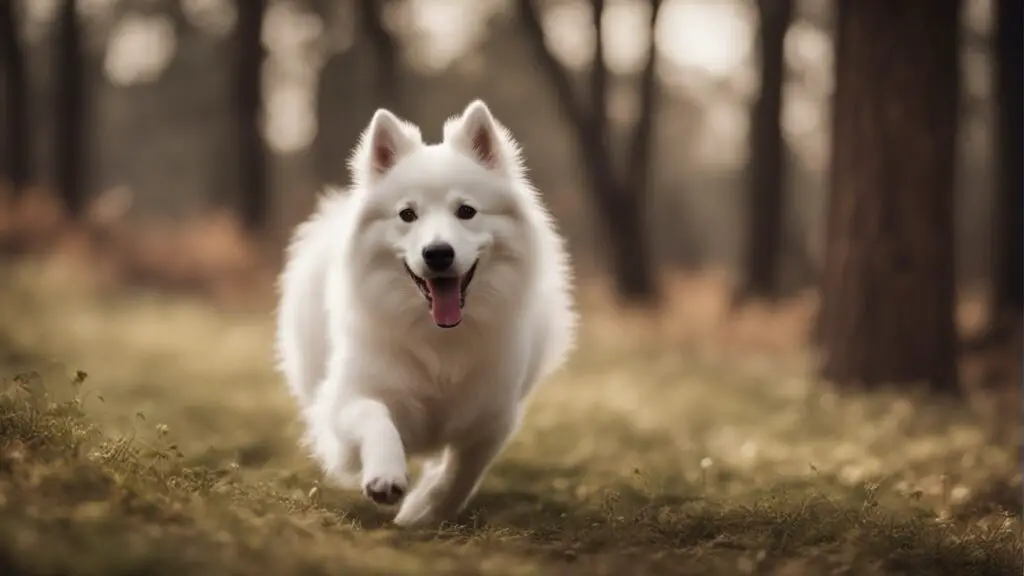
So, if you’re looking for a pup with looks, personality, and smarts – the American Eskimo dog ticks all those boxes!
Exercise Needs of American Eskimo Dogs
American Eskimo dogs, like other dog breeds, need daily physical activity. They’re known for their energy and agility.
Physical Activity
- Daily walks: A simple yet effective exercise to keep your Eskie active.
- Dog sports: These breeds excel in fetch and agility training.
- Family activities: Include them in family outings or games.
Physical activity helps maintain a healthy weight and reduces potential health problems.
Mental Stimulation Exercises
Eskies are intelligent breeds. They enjoy:
- Obedience Training: This breed responds well to commands and enjoys the challenge.
- Chew Toys: Not just a toy, but also an excellent tool for mental stimulation.
- Puzzle Games: Keep their mind sharp with interactive toys.
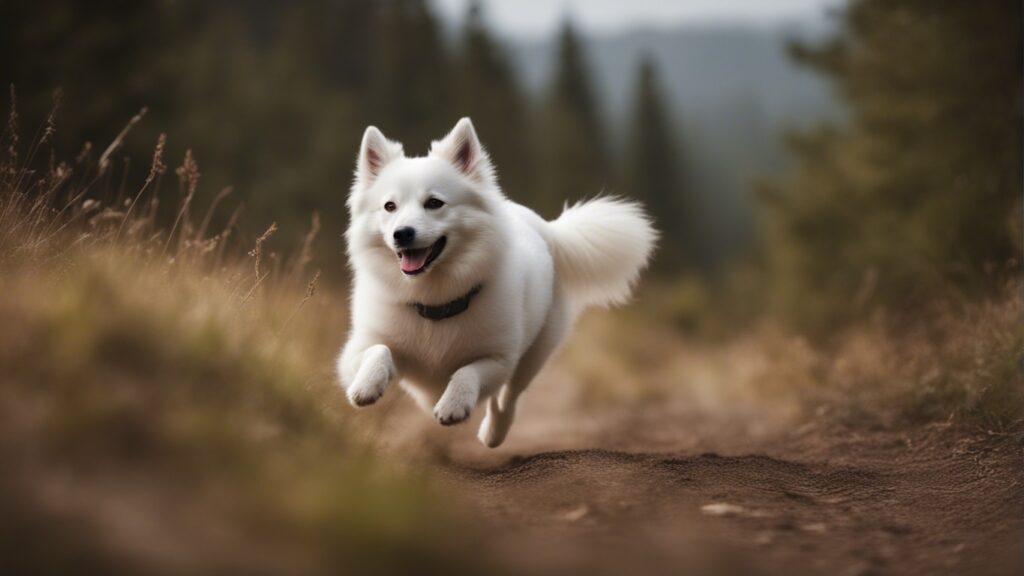
Mental exercises can help alleviate anxiety in this breed.
Remember, each dog breed has unique needs. Tailor the training and activities according to your American Eskimo’s temperament and energy levels.
Grooming and Health Care for American Eskimo Dogs
Brushing their Fur
American Eskimo dogs, a beloved breed among pet owners, require regular brushing to maintain the health of their glorious fur. This grooming task is not just about keeping your pets looking good. It’s also a hands-on check to ensure no health problems are lurking beneath that fluffy coat.
- Use a quality brush designed for pets
- Brush at least once a week
- Pay extra attention during shedding seasons
Common Health Issues
Despite all the love you show them, these dogs may face specific breed-specific health issues. These include hip dysplasia and progressive retinal atrophy. Regular vet check-ups are crucial to detect these conditions early.
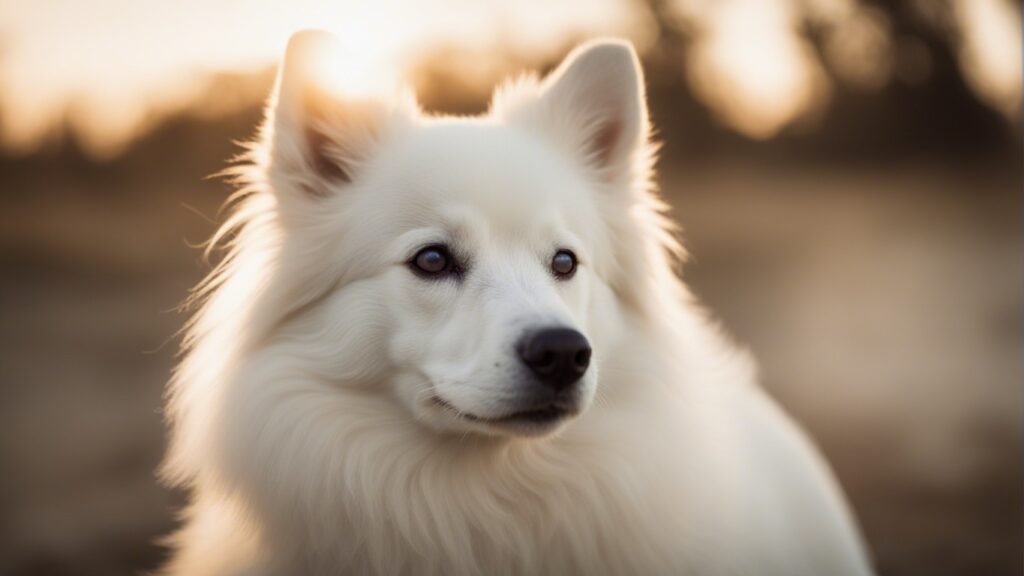
Hip dysplasia symptoms:
- Difficulty standing up
- Limping
- Less activity than usual
Progressive retinal atrophy symptoms:
- Night blindness
- Bumping into objects
- Dilated pupils
Vet Check-ups Importance
Regular vet check-ups can help identify potential problems before they become significant issues in your household.
- Get routine health clearances from your vet.
- Join rescue groups for support and advice.
- Monitor diet and exercise as advised by the vet.
Caring for an American Eskimo dog requires time, patience, and lots of love from their owners, but it’s all worth it when you see them thrive in your care.
Dietary Requirements for American Eskimo Dogs
Balanced Diet Essentials
American Eskimo dogs, like all dogs, need a balanced diet of proteins, fats, and carbohydrates. The right dog food should contain the following:
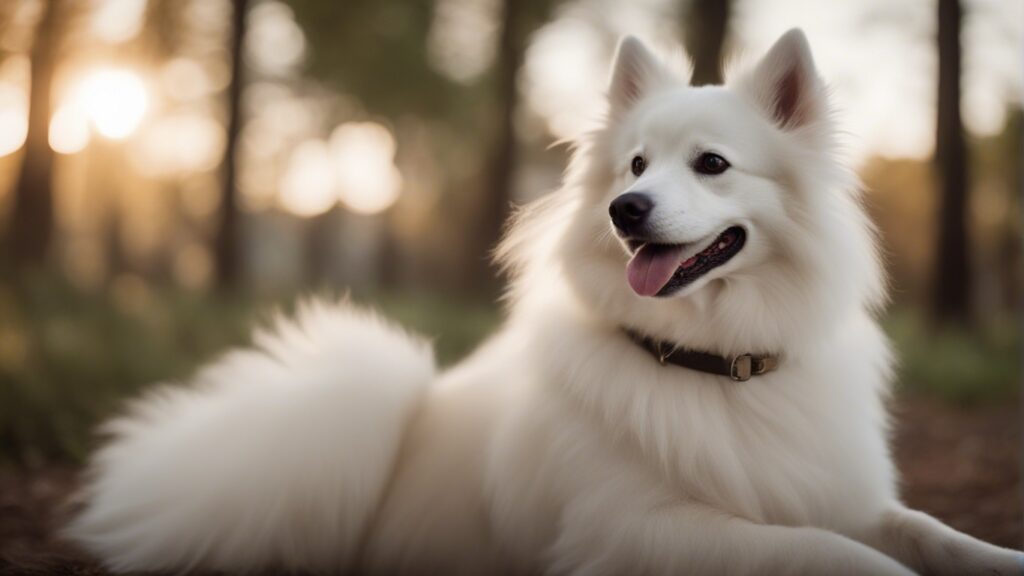
- High-quality animal proteins (like chicken, beef, or fish)
- Healthy fats (like omega-3 fatty acids)
- Complex carbohydrates (like brown rice or sweet potatoes)
Age, Size, and Metabolism Matter
The amount of food your dog needs depends on their age, size, and metabolism. For instance:
- American Eskimo Puppies generally require more food due to their high energy levels.
- Larger dogs typically need more calories than smaller ones.
- A dog with a fast metabolism may need more food than one with a slower metabolic rate.
Human Foods to Avoid
Not all human foods are safe for American Eskimo dogs. Some can be toxic and should be avoided, such as:
- Chocolate
- Grapes
- Onions
- Garlic
- Alcohol
To keep your furry friend healthy and happy, always choose the best dog food that suits their needs. And remember – while treats are fine now and then, they shouldn’t make up more than 10% of your dog’s daily caloric intake!
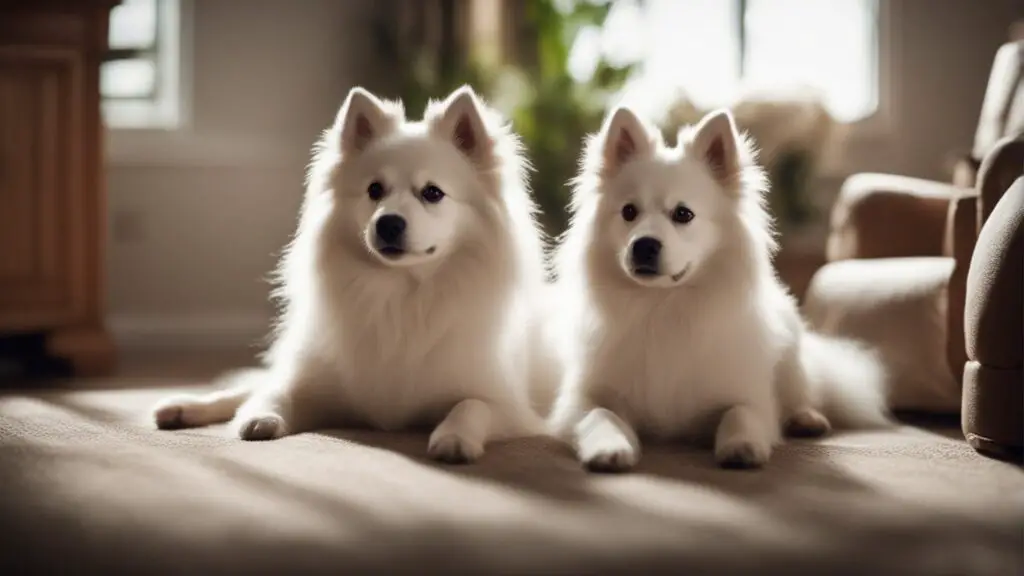
Wrapping Up Your Eskie Knowledge
So, you’ve done your homework on the American Eskimo Dog, or as enthusiasts call them, “Eskies.” You’ve dived into their history, understood their traits, learned about their exercise needs and grooming requirements, and even figured out what to feed them. Now what? Well, it’s time to put that knowledge to good use!
Owning an Eskie isn’t just about having a cute, fluffy friend around. It’s a commitment that requires time and effort. Who said anything worth having comes easy? With the proper care and love, your Eskie will become more than just a pet; they’ll be a part of your family. So go ahead and embrace the challenge because the rewards are worth it! Ready to bring home an Eskie?
Are American Eskimo Dogs Good Family Pets?
Yes! American Eskimo Dogs are known for their friendly nature and loyalty, making them excellent family pets. They’re great with kids, but remember; like all dogs, they should be supervised when interacting with young children.
Do American Eskimo Dogs Shed A Lot?
Indeed, they do. Their beautiful white coats require regular grooming to keep shedding under control.
What Health Problems Do American Eskimo Dogs Have?
While generally healthy dogs, some common health issues in this breed include hip dysplasia, progressive retinal atrophy (PRA), and obesity.
How Much Exercise Does An American Eskimo Dog Need?
American Eskimo Dogs are energetic breeds that need daily exercise. This could range from walks in the park to playtime in the yard.
What Should I Feed My American Eskimo Dog?
A balanced diet is essential for an American Eskimo Dog’s health. High-quality commercial dog food or a well-planned homemade diet can work well for this breed.